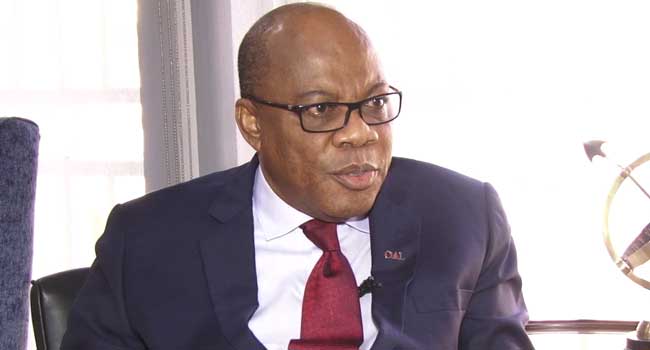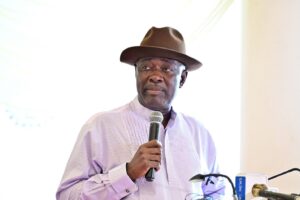
Despite $1trn oil revenue, public debt soars to $91.46bn — Agbakoba
By Esther Agbo
In a startling revelation, Dr. Olisa Agbakoba, Senior Partner at Olisa Agbakoba Legal, highlighted that Nigeria’s public debt has soared to a staggering $91.46 billion (N121.67 trillion), despite the nation’s generation of over $1 trillion in revenue from oil and gas over the past 40 years.
Speaking at a media engagement in Lagos, Agbakoba attributed the ballooning debt to systemic issues, including the exclusion of Nigerians from key value chains, weak enforcement of local content laws, tax avoidance, and pervasive corruption.
Dr. Agbakoba’s policy paper, titled: ‘The Paradox of Nigeria’s Oil and Gas Industry,’ paints a grim picture of missed opportunities and economic mismanagement.
He stated in his presentation “Over the past 40 years, the cumulative revenue from oil and gas has exceeded $1 trillion, an amount that should have been sufficient to transform the nation’s economy and infrastructure.
“Yet, Nigeria consistently resorts to borrowing, with the total public debt standing at N121.67 trillion ($91.46 billion) as of March 31, 2024, according to the Debt Management Office.
“There are 36 value chains related to crude oil exploration, with at least 7 crucial ones largely excluding Nigerian participation: Legal, Shipping, Banking, Insurance, Drilling, Oil Field Services, and Engineering and Construction.
“Over $1 billion worth of legal work is lost to foreign firms annually due to a perception of superior expertise and international experience.
“Nigerian shipping companies are not engaged to ship crude oil products due to the absence of a legal framework for developing a national fleet of vessels, leading to significant loss of potential revenue and employment opportunities.
“Funds from crude oil production are often domiciled in foreign banks, sometimes held for months before remittance to the Central Bank of Nigeria, depriving Nigerian banks of substantial business and the economy of potential multiplier effects.
“The Nigerian insurance industry plays a very insignificant and limited role in the oil and gas Industry. No major Nigerian insurance underwriters cover risks for the over 25,000 foreign vessels in Nigerian cabotage waters or the over 1,000 oil rigs in Nigerian waters, representing a massive loss of premium income for the Nigerian insurance sector.
“The oil field services sector, which includes activities such as seismic surveys, well completion, and production optimization, is dominated by international companies, limiting opportunities for Nigerian businesses.
“Large-scale engineering and construction projects in the oil and gas sector are frequently awarded to foreign companies, despite the potential for local capacity building and job creation if Nigerian firms were more involved.
“Despite the existence of laws like the Coastal and Inland Shipping (Cabotage) Act 2003, Nigerian Oil and Gas Industry Content Development Act, Cabotage Act, and Merchant Shipping Act, Nigerian participation in key industries remains limited.”
Agbakoba however highlighted that foreign agreements often bypass Nigerian laws and select adjudication forums outside Nigeria, which contradicts local content policies.He pointed out that these complex contracts typically put Nigerian entities at a disadvantage due to their limited expertise in international oil and gas law.
Furthermore, in his view, using foreign legal frameworks has occasionally led to unfavourable outcomes for Nigeria in international arbitrations.The current setup heavily favours International Oil Companies (IOCs), resulting in a large portion of revenues flowing out of the country.
IOCs however often have more leverage in negotiations with the government due to their technical expertise and financial resources.
This dominance has resulted in a lack of technology transfer and skill development among local companies.
He mentioned in his book that the estimated revenue from oil rigs is about N3 trillion annually, roughly 15 percent of the National Budget. The loss of this revenue greatly impacts the government’s ability to fund development projects and public services.
The tax avoidance practices of these companies create an uneven playing field and discourage compliant companies.
He also noted that the nation has the potential to increase oil and gas revenue by 30-40 per cent within 5-10 years, potentially adding an additional $15-20 billion annually based on current production levels.
Concluding his presentation from his policy book, he stated, “Enhanced local content implementation, downstream investments, and increased Nigerian participation in key value chains could create an estimated 500,000 to 1 million new jobs in the oil and gas sector and related industries over the next decade.
“With increased refining capacity, reduction in fuel imports, and the development of a national fleet for oil and gas shipping, Nigeria could save $10-15 billion annually in foreign exchange.
“By addressing tax avoidance by oil rig companies, Nigeria could potentially recover up to N3 Trillion yearly (approximately 15 percent of the National Budget) in additional tax revenue.
“Strict enforcement of local content laws and capacity-building initiatives could increase Nigerian companies’ participation in the industry from the current estimated 30 per cent to 70 per cent within 10 years.”
The findings thus emphasised the critical need for Nigeria to rethink its economic strategies and prioritise local content and capacity building to ensure sustainable development and reduce dependency on foreign debt.
As Nigeria navigates its debt crisis, the insights from Agbakoba’s policy paper offer a roadmap for unlocking the nation’s full economic potential.




